11 May 2006 Edition
Seeds of freedom sown in harsh Long Kesh

On Friday 5 May 2006 a party of 19 republicans travelled to Long Kesh, the former prison camp on the outskirts of Lisburn, near Belfast to hold a commemoration ceremony in remembrance of Bobby Sands. The visit, 25 years on represented a long journey. An Phoblacht's PEADAR WHELAN, a former H-Block prisoner, was one of those who travelled to Long Kesh last week. Below he brtiefly describes that long journey from 1981.
Twenty five years ago on 5 May 1981 Bobby Sands died after 66 days on hunger strike. As I stood in Cell 8 in the Long Kesh hospital wing where Bobby died, 25 years on I remembered hearing the news that he had died and thought to myself that we as republicans had come a long way.
Looking at the faces of Tomboy Louden, Jake Jackson, Bik McFarlane and Philip Rooney, close and dear friends of Bobby's, I could see that the pain of 25 years ago was flooding their senses.
Tom Hartley, Danny Morrison and Jim Gibney, men whose work on behalf of the prisoners in the H-Blocks and Armagh Prison took them all over Ireland were also present.
Then there was Síle Darragh, Jennifer McCann, Bronwyn McGahon - women who had come through the worst days of brutality visited on women republican POWs in Armagh and Maghaberry.
Ella O'Dwyer from Tipperary was among the delegation. Imprisoned in England Ella was forced to endure the isolation which the British penal system used in an attempt to break the spirit of republican POWs.
Laurence McKeown was there too, familiar with the surroundings where spent 70 days on hunger strike.
During that hour that we spent in the hospital wing we stood in silent tribute to Bobby, Francie, Raymond and Patsy. We stood in the cells where Joe, Martin, Kieran and Kevin breathed their last. And when it came the time for Tom and Mickey to die they stood their ground.
As I stood in each of the cells where the men died, looking at the bare, dank walls, I could only admire their courage and wonder at their commitment.
I imagined, as I gazed at the beds that stood bare of mattresses, the tortured bodies of men prepared to die for their beliefs.
It wasn't until, afterwards, as I stood outside the prison hospital looking at the dilapidated huts that the screws used and the rusted barbed wire, that I realised just how far we as republicans have come. Long Kesh which was to be the breakers yard, the anvil on which the British government would smash republicanism was falling apart. The architects of the criminalisation policy are politically irrelevant. Who remembers Merlin Rees or Roy Mason? Margaret Thatcher is a caricature of herself.
And then I saw the tree. Growing across from the gates of the hospital a tree in full bloom and I thought of An Piaraisigh when, in his oration at the grave of O'Donavon Rossa he said, "Life springs from death and from the graves of patriot men and women spring living nations".
Long Kesh was not the breakers yard the British planned. It is the rock on which British rule in Ireland ran aground. The lives of the Hunger Strikers, like seeds, have overwhelmed the harshness of the Long Kesh ground and blossomed as trees of freedom.


